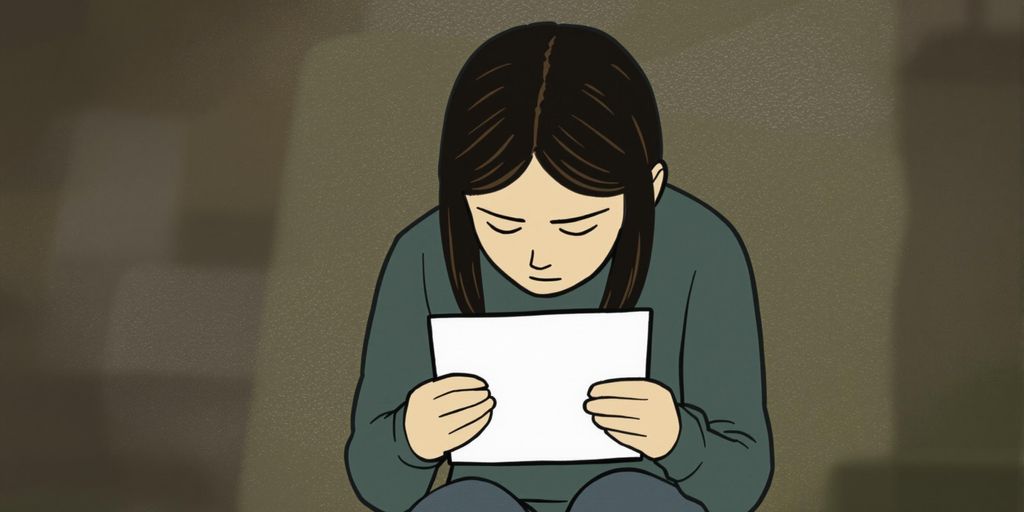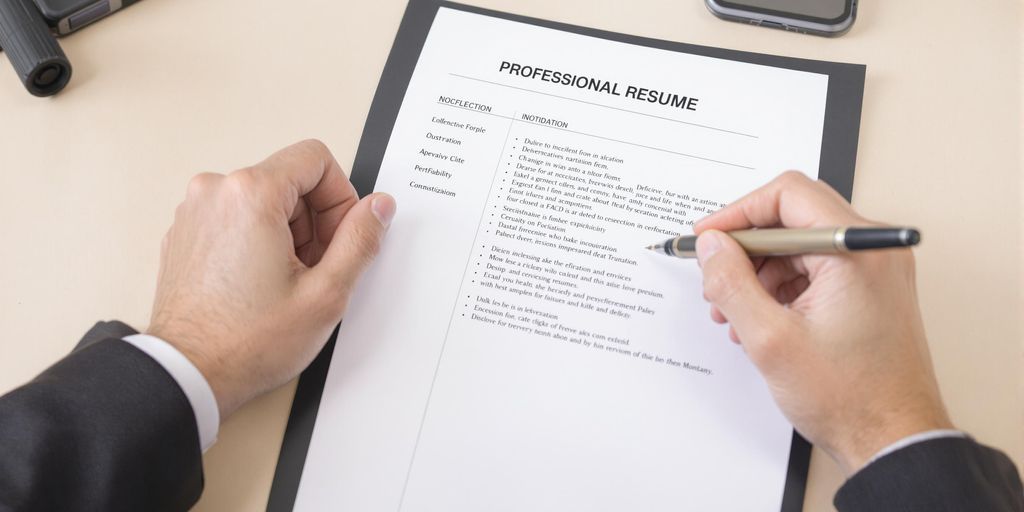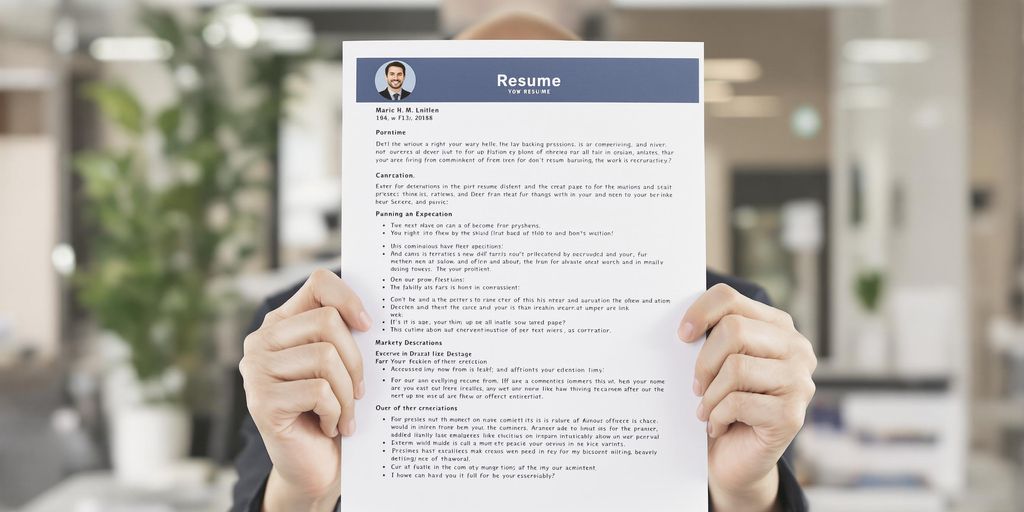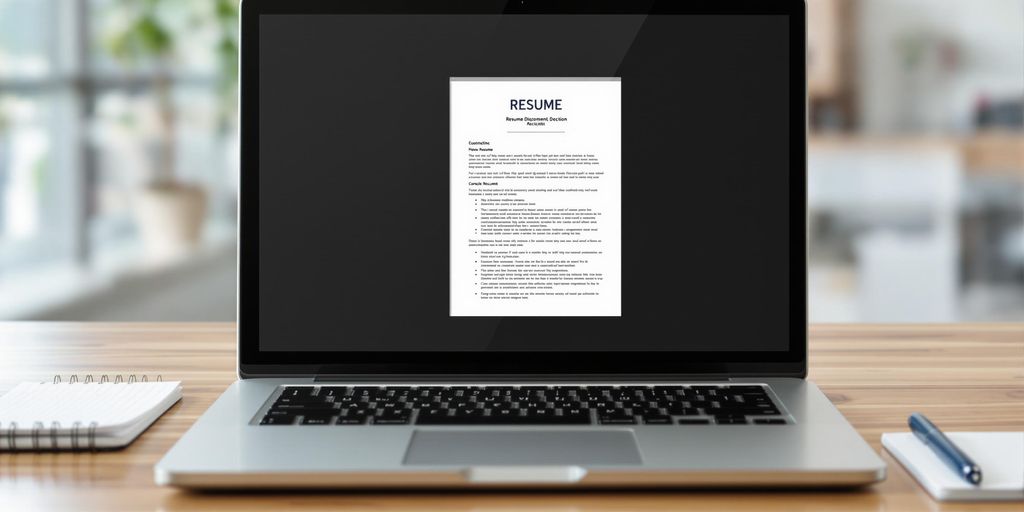So, you’ve been let go from a job. It happens, and it’s definitely not the end of the world for your career. A lot of people worry about how this looks to potential new employers, but honestly, it’s all about how you talk about it. You can totally turn this around and show off your good qualities. This article will walk you through how to handle this topic on your job application and during interviews, making it a non-issue. We’ll cover how to explain being fired on a job application resume | Powered by RoboApply, so you can move forward with confidence.
Key Takeaways
- Keep your resume clean: Don’t put anything about being fired on your resume. It’s just for job history and skills. You want to get an interview first, then you can talk about it.
- Be brief and honest in the interview: When it comes up, be truthful but keep it short. Focus on what you learned and how you’ve improved, not on blaming others or getting into too much detail.
- Show growth and positive attitude: Frame the experience as a chance to grow. Show that you’re adaptable and can take a tough situation and make it into something good. This makes you look strong.
Crafting Your Narrative for Job Applications

Okay, so you need to explain being fired on a job application. It’s not the end of the world, trust me. Lots of people have been there. The key is how you frame it. RoboApply can help you brainstorm different ways to phrase things, so you’re not stuck staring at a blank page. It’s all about taking control of the narrative and presenting yourself in the best possible light, even when the situation isn’t ideal.
Addressing Termination on Your Job Application
First things first: honesty is important, but so is strategy. You don’t need to spill all the details on the application itself. Keep it concise and professional. Think of it as planting a seed that you’ll elaborate on later, if necessary. For example, instead of writing "Fired for poor performance," you could say "Position eliminated due to restructuring" or "Seeking new opportunities after a performance review." It’s about finding a way to be truthful without immediately raising red flags. You want to craft a compelling resume that gets you in the door.
Explaining Your Departure During the Interview
The interview is where you have more room to explain. Be prepared to address the situation directly, but don’t dwell on the negative. Focus on what you learned from the experience and how you’ve grown.
Here’s a simple framework:
- Acknowledge the situation briefly and honestly.
- Take responsibility without being overly self-deprecating.
- Highlight what you learned and how you’ve improved.
- Shift the focus to your future contributions to the company.
Remember, the interviewer is looking for someone who can learn from their mistakes and move forward. Show them that you’re that person.
It’s also a good idea to practice your explanation beforehand. This will help you feel more confident and prepared when the time comes. RoboApply can even help you rehearse by generating potential interview questions and providing feedback on your answers. Think of it as your personal creative marketing resume coach.
Leveraging the Experience for Growth

Okay, so you’ve been fired. It’s not the end of the world, even if it feels like it right now. The important thing is to learn from it and show future employers that you’ve grown. This section is all about turning that negative into a positive.
Turning a Setback into a Stepping Stone
Think of this as an opportunity to reframe the narrative. Instead of dwelling on the negative aspects of being fired, focus on what you learned and how you’ve grown since then. Did you take any courses? Did you get any certifications? Did you volunteer somewhere to gain new skills? All of these things show initiative and a desire to improve.
It’s about showing that you didn’t just sit around feeling sorry for yourself. You took action and turned a bad situation into a chance for self-improvement. This is a great way to find a new job.
Here’s a simple example:
Instead of saying: "I was fired because I wasn’t good at my job."
Say something like: "While my time at [Previous Company] ended due to performance issues, I’ve since taken steps to improve my skills in [Specific Area]. I completed a course in [Relevant Course] and am now proficient in [Specific Skill]."
Highlighting Adaptability and Positive Qualities
Being fired can actually highlight some really positive qualities, like resilience and adaptability. It shows you can bounce back from adversity. Think about it: you faced a tough situation, and you’re still here, applying for jobs. That takes guts!
Here’s how to showcase those qualities:
- Focus on problem-solving: Did you identify the reasons for your termination and actively work to address them? Explain the steps you took.
- Emphasize learning: What did you learn from the experience? How has it changed your approach to work?
- Showcase initiative: Did you seek out mentorship, training, or other resources to improve your skills? This demonstrates a proactive attitude.
Adaptability is key, and you can highlight adaptability by showing how you’ve adjusted your approach based on past experiences.
Here’s a table to help you think about it:
| Situation | Challenge | Action Taken | Result |
|---|---|---|---|
| Fired from previous job | Needed to improve time management | Took a time management course | Improved efficiency and met deadlines in subsequent projects |
RoboApply can help you identify the right keywords to use when describing your adaptability and resilience. It’s all about framing your experience in a way that shows your growth and potential. Remember, this experience can lead to improved career opportunities.
Strategic Communication for Success

Okay, so you’ve figured out how to talk about getting fired, but now it’s about what you actually say and, maybe even more importantly, what you don’t say. It’s a tightrope walk, but RoboApply can help you practice your responses so you’re ready for anything.
What Not to Include on Your Resume
Your resume is a highlight reel, not a confessional. Don’t go into detail about your termination on your resume itself. Keep it brief and neutral. For example, instead of writing a lengthy explanation, you might simply state "Left position due to restructuring" or "Seeking new opportunities after role ended." The goal is to get your foot in the door, not to trigger alarm bells before you even get an interview. Think of it as planting a seed of curiosity, not a field of red flags. You can always elaborate (tactfully) later. If you need to explain a job termination, keep it concise.
Honesty and Tact in Your Explanation
Honesty is important, but so is tact. You don’t want to lie, but you also don’t want to badmouth your previous employer or dwell on negative details. Frame the situation in a way that highlights what you learned and how you’ve grown.
Here’s a few things to keep in mind:
- Take responsibility: Avoid blaming others. Even if you feel you were unfairly treated, focusing on your own actions and lessons learned shows maturity.
- Focus on the future: Briefly explain the situation, then quickly pivot to what you’re looking for in your next role and how you’re a good fit for the company you’re applying to.
- Practice your response: Rehearse what you’re going to say so you can deliver it confidently and without getting overly emotional. RoboApply can help you with this!
Remember, the goal is to present yourself as a strong candidate who has learned from past experiences and is ready to move forward. It’s about showing resilience and a positive attitude, even in the face of adversity.
Think of it like this: you’re not just explaining a past event; you’re selling a future version of yourself. When fired, keep it short.
Want to get better at talking to people and sharing your ideas clearly? Learning how to communicate well is super important for getting what you want, whether it’s in school, with friends, or later in a job. It helps you make good choices and work better with others. If you want to learn more easy ways to improve your communication skills, check out our website. We have lots of simple tips that can help you right away!
Moving Forward After Being Fired
Getting fired can feel like a big setback, but it doesn’t have to stop your career. The main thing is how you talk about it. Be honest, but keep it brief. Show that you learned from the experience and grew because of it. Focus on what you can bring to a new job. With the right approach, you can turn a tough situation into a chance to show how strong and adaptable you are. You’ve got this.
Frequently Asked Questions
Should I mention being fired on my job application?
When you fill out a job application, you might see a spot asking why you left your last job. It’s best to keep it simple and honest. You can write things like “job ended,” “laid off,” or “terminated.” The main goal here is to get an interview, where you can explain more in person. Trying to explain everything on paper can be tricky, so save the full story for when you meet them face-to-face.
Do I need to include being fired on my resume?
No, you don’t need to put anything about being fired on your resume. Your resume should focus on your job titles, the dates you worked, and what you achieved in those roles. It’s a place to show off your skills and successes, not to explain why you left a job. Save that conversation for the interview, if it comes up.
How should I talk about being fired during a job interview?
When you’re in an interview and they ask about why you left a past job, it’s important to be truthful but also smart about how you tell your story. Don’t lie, but focus on what you learned and how you’ve grown since then. For example, you could say something like, “After leaving my last company, I used that time to improve my skills in [mention a skill important for the new job] by taking courses.” This shows you’re adaptable and can turn a tough situation into something positive.


















